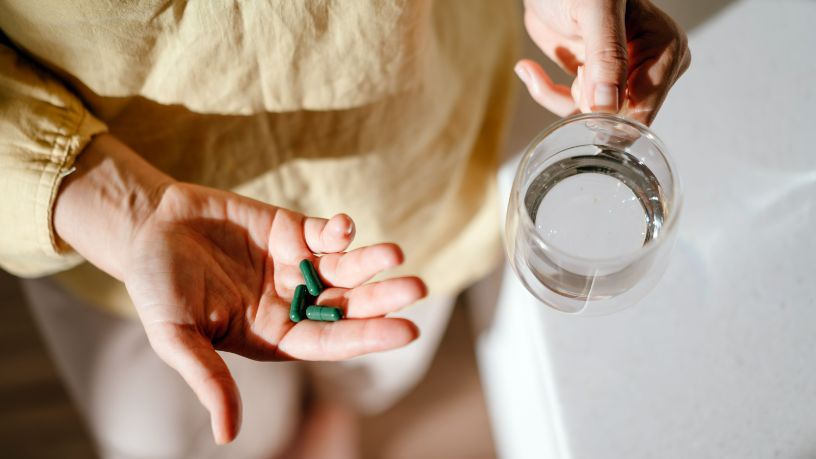Find out what intravenous (IV) vitamin therapy is.
On this page
Key takeaways
There are risks involved with IV vitamin therapy, so make sure you speak with your GP.
Making changes to your diet and exercise and sleep habits can help improve your health.
You may have seen the ads for intravenous (IV) vitamin therapy, with glowing models looking the picture of health.
IV vitamin infusions are a growing trend, with clinics popping up across the country. But what are the benefits of injecting vitamins directly into your bloodstream? And is it safe?
IV vitamins: Worth the hype?
Fluid and vitamin drips claim to cure hangovers, improve wellness, accentuate beauty, help you lose weight, supercharge your immune system and relieve symptoms of chronic disease.
With this range of appealing benefits, it’s easy to see why people are keen to try it.
But Dr Chelsie McMullin, GP and Bupa Medical Advisor, says that for the vast majority of people, vitamin infusions are unnecessary and a waste of money.
Meaning, IV vitamins are most likely not worth the hype for you.
Why inject vitamins at all?
The IV infusion process bypasses the digestive system and infuses vitamins directly into the bloodstream, so they’re immediately available and the body can absorb what it needs.
Clinics offer a range of vitamin concoctions marketed at everything from immunity support and muscle recovery to detox and even hangover cures. You can even customise your own vitamin hit based on how you’re feeling.
While that might sound great in theory, McMullin says unless you have a serious deficiency or health condition that stops you from absorbing vitamins from your diet, most of the injectable concoction will just wind up as very expensive urine.
“If you have a diet that is very poor, you have gut issues or coeliac disease that's stopping you from absorbing vitamins and you’re deficient, then yes there are benefits from having your vitamins through an IV,” says McMullin.
For example, “We give iron infusions to people who have issues with their gut if they can’t tolerate supplements, and for those people an IV injection is more bioavailable, meaning they get the total iron they need immediately.”
“From an immunity perspective, there is some evidence that a large dose of vitamin C can give you a bit of a boost, but you can’t stockpile a surplus of [water-soluble] vitamins in the body,” she adds. “If you have functioning kidneys and a functioning liver, your body will filter out anything it doesn’t need.”
The hydration factor
If you decide to have a fluid and vitamin drip, you’ll likely walk out of the clinic with a spring in your step.
But, McMullin says, this is less about the vitamins and more about the big hit of fluids in your bloodstream that you just received.
“The fact that you've had the volume of fluid quickly will make you feel a little bit better temporarily, especially if you’re hungover or if you’ve been unwell and struggling to eat and drink properly.”
“But that's a very expensive hangover cure, and you’ll likely have the same result if you drink a few electrolyte drinks.”
The risks of IV vitamin therapy
For most younger people without underlying health conditions, getting some extra fluids and vitamins may be harmless.
But for those with heart or kidney problems (which you could be unaware of), getting a big hit of fluids can be dangerous.1
“Especially for older people who might have a slowly evolving condition, giving them a litre of fluid and electrolytes suddenly could cause heart failure or kidney problems,” says McMullin.
So, it’s a good idea to speak to your GP before trying IV vitamin therapy.
There’s also a risk of infection or other complications.
“The drip could accidentally be put in an artery instead of a vein,” says McMullin, “which could cause bleeding or a collection of blood under the skin” (known as a haematoma).
“Another possible complication of an IV line is thrombophlebitis, which is infection and inflammation of the vein. You can also get a clot in a vein after a cannula is put in if it hasn’t been looked after properly.”
Alternatives to IV vitamin therapy
Unfortunately, when it comes to health and wellness there are no shortcuts or silver bullets.
Unless you have a serious deficiency, the best IV-alternative way to supercharge your health is to:
- exercise every day
- eat a diet low in processed foods, sugar and fats
- eat plenty of fruit and vegetables
- drink plenty of water
- ensure you get enough sleep.
If you do that, your body will get everything it needs naturally (and your wallet will feel all the better for it!).

At Bupa, trust is everything
Our health and wellbeing information is regularly reviewed and maintained by a team of healthcare experts, to ensure its relevancy and accuracy. Everyone's health journey is unique and health outcomes vary from person to person.
This content is not a replacement for personalised and specific medical, healthcare, or other professional advice. If you have concerns about your health, see your doctor or other health professional.
You might also like...
Can multivitamins fill gaps in your nutrition?
Supplements are everywhere, from entire supermarket aisles to ads on TV. But can supplements compensate for a poor diet or prevent you from getting sick?
Is it time to up your fibre intake?
Fibre can help prevent bowel problems and keep us feeling well, but most of us aren't eating enough. Are you?
Does coffee make you poop?
From one coffee enthusiast to the next, we find out why the hot beverage could make you run.
Vegetarian and plant-based diets: What’s the difference?
Food trends may come and go, but eating more plants and less meat might be here to stay.





